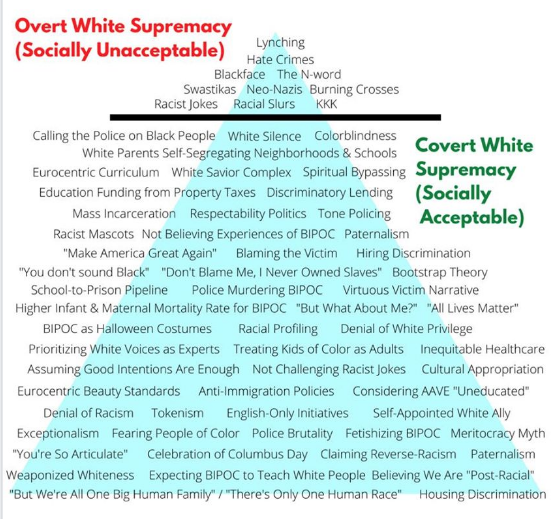
I can still remember vividly my first conversation about how hard the effects of racism are on African-Americans. It was about 1995 and I was stationed in Colorado Springs. I was a senior Captain, talking with a black major and another white major during a break (perhaps lunch, but it was at the office). This black officer was married to another black officer (a Lt Col) and they didn’t have any children, so they were financially well off with two mid-level officer’s salaries. He drove a really nice new BMW, at a time when very few people could afford a BMW. And at some point in the conversation, this very easy-going man said with an exasperated pain, “I am so tired of being pulled over for being a black man driving a BMW. They always think for a black man to be driving this kind of car, I must have stolen it.” This was not in the South; this was in Colorado Springs. I grew up in Arkansas, with a school population of ~35% African-American, and had many relationships and interactions with blacks, but I’d never had the honest conversation about the pain that can come from being a black man in a predominately white culture. While I could empathize and lament with him, this was a problem that defied any action in my mind. How does one change hearts? While I lamented, I took solace in the improvements that had happened, seemingly every year in more and more achievements by African-Americans as they overcame tremendous obstacles as well as majority culture increasingly valuing their contributions. Theodore Johnson has a similar poignant history he recently shared on National Review. Sen Tim Scott relates similar ongoing racism he experiences even as a U.S. Senator here. America is a good country, as countries in a fallen world go, and has made much progress in race relations. But that doesn’t mean we don’t have far to go–almost everyone can agree that more needs to be done, especially in the aftermath of the George Floyd video.
But where we go is the issue of debate. In the ongoing tension over racial issues, there is no progressive room for disagreement, and many fear for their livelihood should they say anything that someone could say that they are offended by. And if they aren’t fearful, they should be–it’s not just conservative thinking that is in the crosshairs, but anybody not sufficiently committed. Jonathan Chait’s article last week highlights the collateral damage to some on the left for not being completely on board with the latest progressive ideas.* Corporately, it’s hard to find any organization that hasn’t condemned racism recently, which while appropriate feels more like platitudes than a genuine commitment to love one another better. Many organizations are finding that the safest way to burnish progressive credentials is to endorse Black Lives Matter. The question is should they?
Despite the near unity in the country of the injustice George Floyd’s death, progressives insist that a far bigger change is needed to prove one is not a white supremacist. A popular chart among progressives continues adding more categories for Covert White Supremacism, including things which seem appropriate while smuggling in things that are highly debatable, e.g., Make America Great Again is part of White Supremacism as well as celebrating Columbus Day. I suspect many non-white, non-progressives can read through this list and will be shocked to find out that they too are supporting white supremacy.

It is not enough to agree that George Floyd’s death was a brutal murder, and that we need to reform the use of deadly force by police officers. There is an increasing long list of things you must agree with to be “woke.” This leads Christians that want to support all of God’s image-bearers being equitably treated (especially by our government) to look more closely at the Black Lives Matter movement as perhaps a focal point to harness needed cultural change. Yet a quick look at Black Lives Matter website on their beliefs reveals a deeply unbiblical worldview; specifically the Black Lives Matter movement is fully behind the destructive sexual revolution, and not supportive of the traditional family:
We are guided by the fact that all Black lives matter, regardless of actual or perceived sexual identity, gender identity, gender expression, economic status, ability, disability, religious beliefs or disbeliefs, immigration status, or location.
We make space for transgender brothers and sisters to participate and lead.
We are self-reflexive and do the work required to dismantle cisgender privilege and uplift Black trans folk, especially Black trans women who continue to be disproportionately impacted by trans-antagonistic violence.
We build a space that affirms Black women and is free from sexism, misogyny, and environments in which men are centered.
We practice empathy. We engage comrades with the intent to learn about and connect with their contexts.
We make our spaces family-friendly and enable parents to fully participate with their children. We dismantle the patriarchal practice that requires mothers to work “double shifts” so that they can mother in private even as they participate in public justice work.
We disrupt the Western-prescribed nuclear family structure requirement by supporting each other as extended families and “villages” that collectively care for one another, especially our children, to the degree that mothers, parents, and children are comfortable.
We foster a queer‐affirming network. When we gather, we do so with the intention of freeing ourselves from the tight grip of heteronormative thinking, or rather, the belief that all in the world are heterosexual (unless s/he or they disclose otherwise).
So while in full agreement that black lives matter, I find myself quite opposed to Black Lives Matter. While one should agree with the name itself, the organization behind it brings a whole lot of baggage. Inherent in most of the current cultural critique is the right recognition that every individual has inherent dignity due to being created in the image of God. It is precisely that dignity that demands we seek justice for George Floyd and others who have had their lives callously taken by others. As we read in Gen 9: 5b-6:
From his fellow man I will require a reckoning for the life of man.“Whoever sheds the blood of man, by man shall his blood be shed, for God made man in his own image.
Nevertheless, truly loving our African-American neighbor (and all other races and ethnicities) requires us pointing toward a loving and holy God, and His good plans for our lives. God has revealed His best for our lives, and our repudiation of His biblical commands is in large part a reason for ongoing poverty among many citizens, of various races (e.g., the significant out-of-wedlock birth rate coincident with denigrating fatherhood). Nowhere has the destruction of the “Western-prescribed nuclear family structure” left more devastation than in African-American communities (although they are certainly not alone), so its particularly odd that Black Lives Matter would choose to attack this God-given institution. As Senator Tim Scott notes,
“If you have two parents in the household,” he says, citing the economist Thomas Sowell, “you reduce poverty in the African-American community by 85%. That’s a stunning truth that needs more oxygen.”
Also notice that Black Lives Matter’s collective care list for families specifically calls out mothers, but not fathers, when everyone knows (or should know!) the importance of fathers in children’s lives. Certainly President Obama knew this, and often proclaimed it.
We need fathers to realize that responsibility does not end at conception. We need them to realize that what makes you a man is not the ability to have a child — it’s the courage to raise one.
Partisan America (left and right) demands you be all in, one way or the other. Christians must reject this partisanship–there may be ideas on both sides that are biblical and unbiblical. A biblical worldview always supports helping the disadvantaged, and it requires us to pursue justice for all people. But nowhere is it to tear others down to do that, and it certainly does not require endorsing behavior that God condemns and is opposite of promoting human dignity, e.g., the degradation of our bodies through sexual immorality. We must always be looking for opportunities for both/and, not either/or. We must share some common public policy goals of Black Lives Matter and other progressive groups that are concerned with the human dignity of other image-bearers, but unless Black Lives Matter will submit to biblical authority, we will not support Black Lives Matter.
* In a very important way, this is the death of liberalism within the Democratic party. I don’t want to stray off-topic, but beyond classical liberalism (which I generally agree with) modern liberalism itself is being extinguished in the ongoing progressive push–that’s a big part of the reason for Chait’s article linked above. We are the woke. You will be assimilated. Resistance is futile.
 Bert Wheeler
Bert Wheeler
 Jeff Haymond
Jeff Haymond
 Marc Clauson
Marc Clauson
 Mark Caleb Smith
Mark Caleb Smith
 Tom Mach
Tom Mach